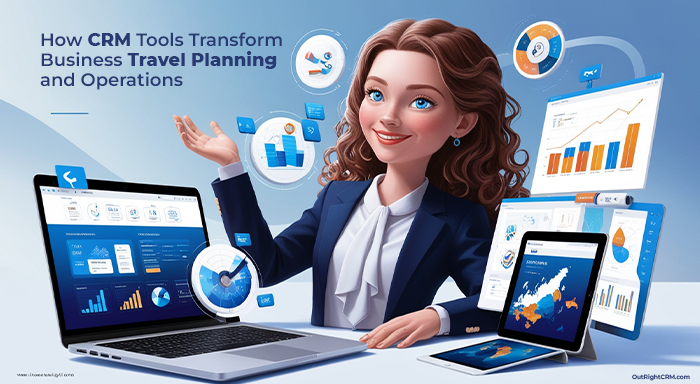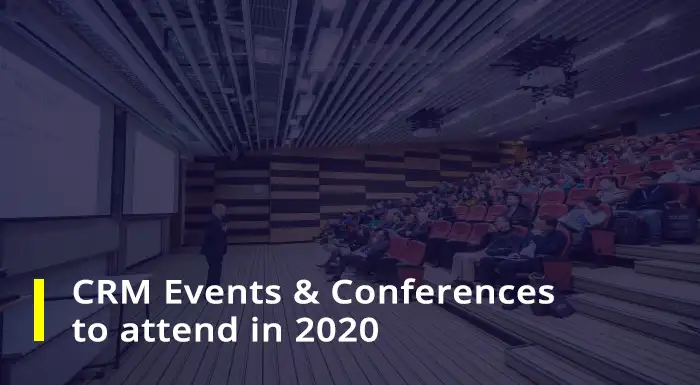Business travel is costly, and in 2024, it will have many opponents. In the past, you had no alternative to traveling abroad for a business meeting, but now, you can schedule a meeting in half an hour and connect to Zoom via your phone. So, if you are traveling for business, to justify the necessity for traveling, you would have to plan and execute it flawlessly. Here’s how a CRM (customer relationship management) tools could help you in this endeavor.
Centralized traveler information
CRM tools can also be used to centralize employee travel profiles, preferences, and previous trip data. In other words, you get a chance to see exactly which of your business travelers prefers what kind of accommodation transportation and get a better idea of their travel habits.
This is great because it allows you to observe their travel habits through data, allowing you to develop a more impartial view of them on their travels. You see, it’s really easy to let a bit more generously on business travel when it’s your favorite employee. With someone else, you might be a tad stricter. This way, you’ll be removed from the scenarios more, and you’ll have a more impartial take.
This also allows you to organize a trip to be more to their liking. Now, we understand what you think: this is a business trip; they’re not traveling for luxury, so why would convenience matter? The very point of business meetings is to discuss things that have to be spoken in person, make inspections, and leave a good impression. All of these things are easier when you are on your A-game. Otherwise, you could just schedule a Zoom meeting.
By analyzing their past itineraries, you’ll learn how they prefer to do things. By comparing these itineraries to the outcomes of these trips, you’ll be able to see if their preferred way of doing things is the best way of doing things. This will also allow you to suggest improvements. This softer approach to travel optimization can be seen as a valuable piece of feedback. It’s like noticing that their swing is flawed and making a suggestion of how to make it better.
Overall, having all this data in one place helps you organize a lot better.
Expense Tracking and Reporting
Another thing you have to keep in mind is that you can integrate a CRM with all sorts of expense management software. If you’re using another tool for corporate travel management, you can make one more integration and make sure that you get a grip on every single penny that gets spent on these business travels.
You need to monitor business travel spending.
First of all, it’s a major expense, and you need to understand how much the trip costs so that you can budget all future business trips. This also allows you to make a projection of your future business trips and get a much firmer grip on your finances, in general.
It’s also worth mentioning that if your employees are going to misappropriate company resources, this is one of their best opportunities. First of all, they’re often on their own. Second, they’re often paying in different currencies and according to prices that could be much different than back at home. In other words, it’s a lot harder to track and a lot easier for them to get away with it.
Another thing you have to remember is that, in 2024, traveling for business is much harder to justify. You can have virtual tours, hire mobility workers, get in touch with local businesses, and schedule meetings via Zoom. Technically, other than having/wanting to be there in person, it’s really hard to justify traveling across the globe.
Other than being a massive waste of time, the biggest anti-business-travel argument that its opponents bring up is the cost. So, having a figure to show (how much the trip costs exactly versus how much its effect will bring in) might be the best way to justify these trips abroad.
Automated Travel Itineraries
CRM systems can be set up to automatically generate itineraries based on user preferences and past travel data. This will greatly help businesses reduce the time spent planning trips by just auto-filling details like preferred airlines, transportation, or hotels. In other words, you save a lot of time by reducing the manual workload necessary to organize these trips.
Here are a few more concrete ways how this helps you with business travel planning and operations.
Automated travel itineraries take the hassle out of manually organizing every detail. By leveraging CRM tools, businesses can pre-fill itineraries based on employee preferences and past trips. This saves time for both the traveler and the manager.
When you rely on automated itineraries powered by CRM, there’s less room for error. The system uses reliable data, like frequent flyer numbers, seating preferences, and preferred hotels, ensuring consistent bookings. This accuracy avoids mistakes such as wrong bookings or missing essential travel preferences that could cause inconvenience.
Automation doesn’t mean impersonal. CRM tools can tailor itineraries based on employees’ unique preferences, ensuring every trip feels custom-made. Whether it’s selecting a specific airline, booking pet-friendly hotels, or arranging ground transportation, the CRM remembers past preferences to make each trip as comfortable as possible.
Travel itineraries aren’t static, and things change at the last minute. CRM systems can automatically send updates and reminders if flight times shift or hotel reservations need adjustments. Employees get real-time notifications, keeping them in the loop and reducing the stress of travel changes.
Improved Communication
There are many different forms of communication, and communicating while away is often quite difficult. It’s not just that you don’t have the means to communicate. After all, you have access to the internet. It’s just that you don’t have time, stamina, or all your files/devices. With CRM, most of this can be made quite easy.
For instance, with CRM tools, communicating essential travel details becomes effortless. Instead of manually sending flight times, hotel confirmations, or itinerary updates, businesses can automate these messages.
Delays, cancellations, and unexpected changes are common in travel. A CRM can automatically notify employees of any updates, like a delayed flight or a rebooked hotel. This real-time communication reduces stress, keeps travelers better prepared, and ensures no critical details are missed, even when plans shift.
Whether it’s a reminder about the company’s travel policy or an emergency security update, CRM tools help deliver important information quickly. This ensures that employees stay aware of guidelines or any urgent issues while they’re on the road, helping to maintain both compliance and safety during business trips.
Instead of juggling multiple platforms, CRM tools centralize all communication related to travel in one place. From trip itineraries to expense reports, employees can easily access all the details they need. This unified approach simplifies communication, making it easier for both the travel coordinator and the traveler to stay connected.
Data-driven Decision Making
When it comes to travel, even business travel, emotions often get the better of people. They tend to overvalue the importance of the impression they make by arriving at the meeting in a rented luxury car compared to an Uber or fail to see how a slight improvement in their itinerary could make a huge change.
This is where CRM tools could help supply cold, hard numbers and settle the issue.
With CRM tools, businesses can collect and analyze valuable travel data from frequently visited destinations to preferred airlines. These insights help decision-makers understand travel patterns, allowing them to make more informed choices about future trips. It’s not just about tracking the past; it’s about optimizing the future.
CRM systems help identify trends in travel spending, showing which trips cost more or which departments exceed their budgets. By having access to this data, businesses can make smarter budgeting decisions, negotiate better rates with airlines or hotels, and allocate travel funds more efficiently across the organization.
When you know where most of your travel expenses are going, you’re in a better position to negotiate with vendors. CRM data can highlight frequent service providers or hotels, helping businesses leverage this information to secure discounts or special deals. It turns past travel data into a bargaining chip for cost savings.
Beyond just saving money, CRM data helps with strategic travel planning. For example, you can identify peak travel times, optimize travel schedules, or make data-backed decisions on whether virtual meetings might replace certain trips. It’s about using travel data to enhance both the efficiency and impact of business operations.
CRM is a versatile and integrative tool you can use to improve your business travel planning
You just have to remember that a CRM can be used to gather employee data, as well, not just customer data. Then, you can use this data in order to improve the way they travel and, by proxy, the success rate of all their business travels. It will allow you to squeeze a bit of extra value from a trend that some believe was already made obsolete
By Srdjan Gombar
Veteran content writer, published author, and amateur boxer. Srdjan has a Bachelor of Arts in English Language & Literature and is passionate about technology, pop culture, and self-improvement. In his free time, he reads, watches movies, and plays Super Mario Bros. with his son.








